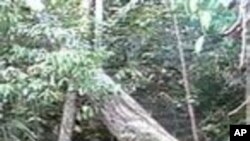The United States and Indonesian governments signed a debt-for-nature swap agreement that will help preserve threatened forest habitats. The agreement will reduce Indonesia's debt payments to the U.S. by nearly $30 million over 8 years.
In return, the government of Indonesia will commit these funds to support grants to protect and restore the country's tropical forests. In partnership with Conservation International and the Indonesian Biodiversity Foundation [Yayasan Keanekaragaman Hayati Indonesia] known as KEHATI, the Tropical Forest Conservation Act agreement will be the first ever in Indonesia as well as the largest debt-for-nature swap of its kind. The agreement is an important element of the Comprehensive Partnership currently being built by the United States and Indonesia.
"Indonesia is one of the most biologically diverse countries on earth," said U.S. Ambassador to Indonesia Cameron Hume. "Funds generated by the debt-for-nature program will help Indonesia protect critical forest habitats in Sumatra."
Sumatra is home to hundreds of mammal, bird and plant species, many of which are rare or endangered, including the Sumatran tiger, elephant, rhino, and orangutan. The grants are designed to improve natural resource management and conservation efforts, and develop sustainable livelihoods for local people and communities who rely on forests.
The Indonesian agreement marks the 15th Tropical Forest Conservation Act pact, with agreements between the United States and Bangladesh, Belize, Botswana, Colombia, Costa Rica, El Salvador, Guatemala, Jamaica, Paraguay, the Philippines, and two agreements each with Panama and Peru. Over time, these debt-for-nature programs will together generate over $218 million to protect tropical forests.
KEHATI was established in 1995 to support and facilitate biodiversity conservation in Indonesia. The funds provided will be used to support grants that will conserve and restore important tropical forests in Northern, Central, and Southern Sumatra, including priority areas such as Batang Gadis National Park, Bukit Tigapuluh National Park, Way Kambas National Park, and Siberut Island, famous for its uniqueness and extremely rich biodiversity.
Sumatra holds 210 mammal species and 582 bird species, many of which are rare or endangered, and at least 688 plant species, including the world's tallest flower. These forests are home to numerous species found only in Indonesia. The United States is proud to work with its partner Indonesia to help that nation preserve its irreplaceable treasure of biodiversity.




